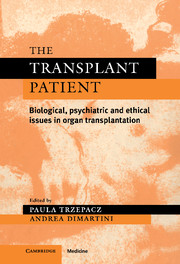Book contents
- Frontmatter
- Contents
- List of contributors
- Preface
- 1 The mystique of transplantation: biologic and psychiatric considerations
- 2 Psychosocial screening and selection of candidates for organ transplantation
- 3 Psychosocial issues in living organ donation
- 4 Quality of life in organ transplantation: effects on adult recipients and their families
- 5 Quality of life of geriatric patients following transplantation: short- and long-term outcomes
- 6 Cognitive assessment in organ transplantation
- 7 Pharmacologic issues in organ transplantation: psychopharmacology and neuropsychiatric medication side effects
- 8 Alcoholism and organ transplantation
- 9 Ethics and images in organ transplantation
- 10 Psychoneuroimmunology and organ transplantation: theory and practice
- 11 Pediatric transplantation
- 12 Current trends and new developments in transplantation
- Index
2 - Psychosocial screening and selection of candidates for organ transplantation
Published online by Cambridge University Press: 14 September 2009
- Frontmatter
- Contents
- List of contributors
- Preface
- 1 The mystique of transplantation: biologic and psychiatric considerations
- 2 Psychosocial screening and selection of candidates for organ transplantation
- 3 Psychosocial issues in living organ donation
- 4 Quality of life in organ transplantation: effects on adult recipients and their families
- 5 Quality of life of geriatric patients following transplantation: short- and long-term outcomes
- 6 Cognitive assessment in organ transplantation
- 7 Pharmacologic issues in organ transplantation: psychopharmacology and neuropsychiatric medication side effects
- 8 Alcoholism and organ transplantation
- 9 Ethics and images in organ transplantation
- 10 Psychoneuroimmunology and organ transplantation: theory and practice
- 11 Pediatric transplantation
- 12 Current trends and new developments in transplantation
- Index
Summary
Overview
Since the earliest days of organ transplantation, psychiatrists and other mental health professionals have been involved in the screening and selection of candidates to receive these surgeries. Postoperative psychiatric disorders were common among the first disorders noted in patients undergoing transplant surgery, and these outcomes, while less common and more manageable today, still influence selection of patients, since pretransplant psychopathology is a predictor for post-transplant psychopathology. As a result of the growing shortage of organ donors relative to the number of persons in need of transplant surgery, there is increased pressure to select the patients most likely to benefit from the surgery, from medical and psychosocial perspectives. Concerns include the patient's ability to cope with the stresses of surgery, postoperative complications and a rigorous medical regimen, capacity to comply with lifestyle changes necessary to minimize morbidity and mortality, and attainment of a satisfactory rehabilitation and quality of life following transplant. In this chapter on psychosocial screening of transplant candidates, we discuss in turn relevant medical issues, the rationale behind screening, characteristics of screening processes (evaluation process, criteria, outcome) instruments and psychological tests used, and clinical issues related to disability law in the USA.
Patient selection – medical issues
Over the past decade, consensus within the transplant community has developed regarding some criteria for organ candidate selection and position on waiting lists. In general, the sickest patients with the least life expectancy and most limited functional capacity move to the top of the list, while patients with fewer lifestyle restrictions and with the ability to wait longer are given lower priority.
- Type
- Chapter
- Information
- The Transplant PatientBiological, Psychiatric and Ethical Issues in Organ Transplantation, pp. 21 - 41Publisher: Cambridge University PressPrint publication year: 2000
- 16
- Cited by

